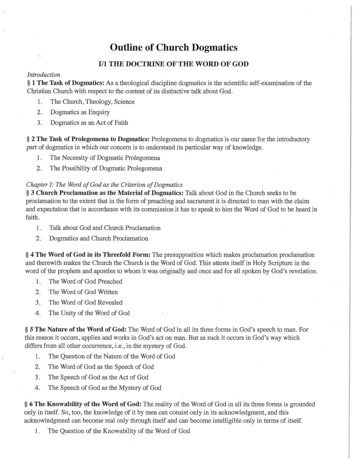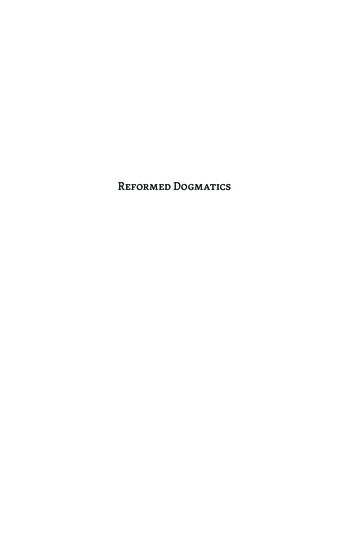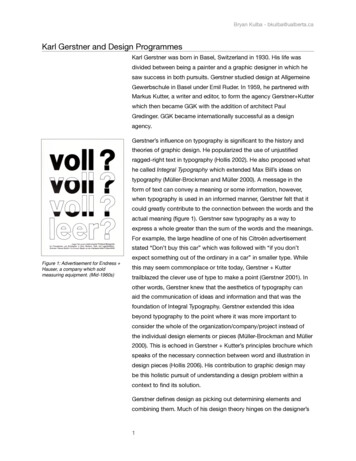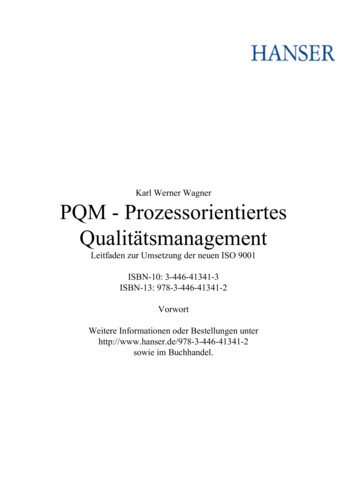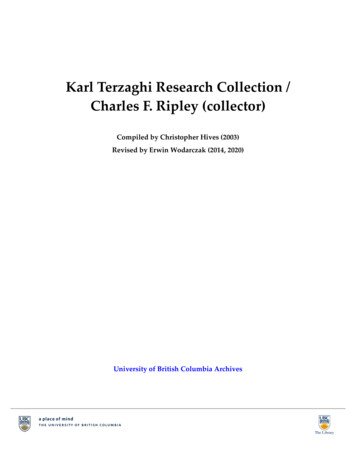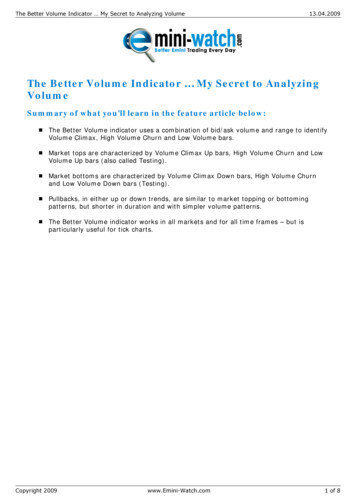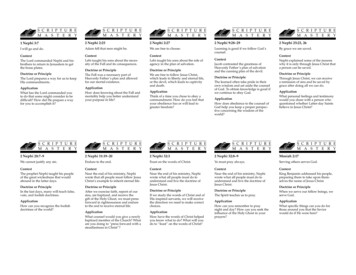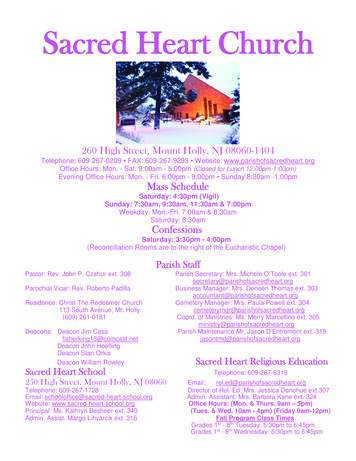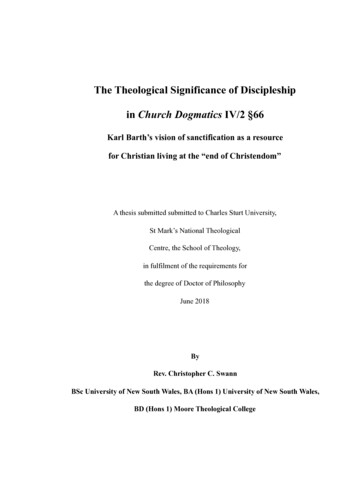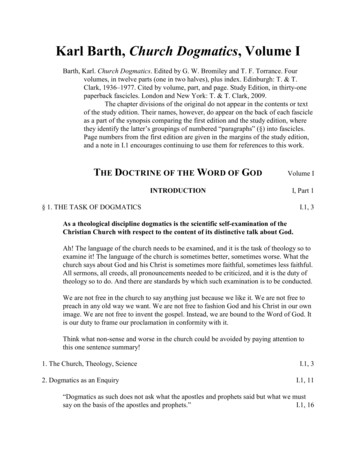
Transcription
Karl Barth, Church Dogmatics, Volume IBarth, Karl. Church Dogmatics. Edited by G. W. Bromiley and T. F. Torrance. Fourvolumes, in twelve parts (one in two halves), plus index. Edinburgh: T. & T.Clark, 1936–1977. Cited by volume, part, and page. Study Edition, in thirty-onepaperback fascicles. London and New York: T. & T. Clark, 2009.The chapter divisions of the original do not appear in the contents or textof the study edition. Their names, however, do appear on the back of each fascicleas a part of the synopsis comparing the first edition and the study edition, wherethey identify the latter’s groupings of numbered “paragraphs” (§) into fascicles.Page numbers from the first edition are given in the margins of the study edition,and a note in I.1 encourages continuing to use them for references to this work.THE DOCTRINE OF THE WORD OF GODINTRODUCTIONVolume II, Part 1§ 1. THE TASK OF DOGMATICSI.1, 3As a theological discipline dogmatics is the scientific self-examination of theChristian Church with respect to the content of its distinctive talk about God.Ah! The language of the church needs to be examined, and it is the task of theology so toexamine it! The language of the church is sometimes better, sometimes worse. What thechurch says about God and his Christ is sometimes more faithful, sometimes less faithful.All sermons, all creeds, all pronouncements needed to be criticized, and it is the duty oftheology so to do. And there are standards by which such examination is to be conducted.We are not free in the church to say anything just because we like it. We are not free topreach in any old way we want. We are not free to fashion God and his Christ in our ownimage. We are not free to invent the gospel. Instead, we are bound to the Word of God. Itis our duty to frame our proclamation in conformity with it.Think what non-sense and worse in the church could be avoided by paying attention tothis one sentence summary!1. The Church, Theology, Science2. Dogmatics as an EnquiryI.1, 3I.1, 11“Dogmatics as such does not ask what the apostles and prophets said but what we mustsay on the basis of the apostles and prophets.”I.1, 16
KARL BARTH , CHURCH DOGMATICS, VOLUME I23. Dogmatics as an Act of FaithI.1, 17§ 2. THE TASK OF PROLEGOMENA TO DOGMATICSI.1, 25Prolegomena to dogmatics is our name for the introductory part of dogmatics inwhich our concern is to understand its particular way to knowledge.Ah! Echoes of John Calvin already. You will remember that Calvin defined faith asknowledge:“Now we shall possess a right definition of faith if we call it a firm and certainknowledge of God’s benevolence toward us, founded upon the truth of the freelygiven promise in Christ, both revealed to our minds and sealed upon our heartsthrough the Holy Spirit.” (Institutes, 3.2.7, emphasis added)The Christian faith is not simply a matter of feeling or personal opinion. It is a matter ofknowledge! And therefore theology, as a study of that faith, has to do with knowledge.1. The Necessity of Dogmatic ProlegomenaI.1, 25“Knowledge of the revelation believed in the Church does not stand or fall with thegeneral religious possibility that is made easier by the ancient view of things and moredifficult by the modern.”I.1, 28“Revelation itself creates of itself the necessary point of contact in man.”I.1, 29How seriously does Barth take this knowledge? Consider its implications for apologetics:“All planned apologetics and polemics have obviously been irresponsible, irrelevant andtherefore ineffective. . . . In such apologetics faith must clearly take unbelief seriously.Hence it cannot take itself with full seriousness. Secretly or openly, therefore, it ceases tobe faith. . . . Does not the credal statement concerning the remission of sins itself forbidany discussion in which the unbelief of the partner in discussion is taken seriously?” (p.30)We believe in the forgiveness of sin! By the freely given promise in Christ and the workof the Holy Spirit, we believe in the forgiveness of sin. Therefore we cannot possibly takesin as seriously as we do forgiveness. We cannot take unbelief as seriously as we do faith.It occurs to me that this dismissal of planned apologetics might be part of the reason thatsome Christians who understand themselves as Evangelicals reject Barth. There arenon-denominational seminaries in this country where courses are taught in apologeticsand, perhaps, where there are departments of apologetics. Books are being written ofapologetics, trying to argue to the world how good, useful, and true the Christian faith is.
KARL BARTH , CHURCH DOGMATICS, VOLUME I3But do not such efforts continue, as Barth pointed out, to take unbelief more seriouslythan it deserves?“By heresy we understand a form of Christian faith which we cannot deny to be a form ofChristian faith from the formal standpoint, i.e., in so far as it, too, relates to Jesus Christ,to His Church, to baptism, Holy Scripture and the common Christian creeds, but inrespect of which we cannot really understand what we are about when we recognise it assuch, since we can understand its content, its interpretation of these commonpresuppositions, only as a contradiction of faith.”I.1, 32Don’t rush past the notes in small print. Here is one about heresy, which Barthunderstands to be Christian in “form” but a contradiction of the faith in “content”:“Even when this [conflict with heretics] included the by no means laudable nor evennecessary mutual abuse or even burnings of those past days, there was meaning in it,since the Church and heretics were talking very differently about the same theme, andtherefore not talking past one another but in opposition to one another. There was thus aheadlong collision such as can only take place between contending brothers. The muchvaunted progress made between the 17th and 18th centuries consisted in the decision totolerate one another, i.e., to abandon one another to the appropriate fate. This was the firstbreach in fellowship hitherto continually maintained in conflict.” (pp. 32-33)Toleration, the great high virtue of the day in which we live, is not an expression oroutgrowth of Christian faith but an abandonment of faith, an abandonment of love, andtherefore an act of unbelief! Toleration is not an act of caring for the other but an act ofabandoning the other. Toleration does not foster fellowship but is itself a breach infellowship.2. The Possibility of Dogmatic ProlegomenaI.1, 36CHAPTER I. THE WORD OF GOD AS THE CRITERION OF DOGMATICS§ 3. CHURCH PROCLAMATION AS THE MATERIAL OF DOGMATICSI.1, 47Talk about God in the Church seeks to be proclamation to the extent that in theform of preaching and sacrament it is directed to man with the claim andexpectation that in accordance with its commission it has to speak to him the Wordof God to be heard in faith. Inasmuch as it is a human word in spite of this claimand expectation, it is the material of dogmatics, i.e., of the investigation of itsresponsibility as measured by the Word of God which it seeks to proclaim.1. Talk about God and Church ProclamationI.1, 47“We know ourselves only as the man to whom mercy is shown as one who is fallen, lostand condemned. We know ourselves only as man in the kingdom of grace, of the present
KARL BARTH , CHURCH DOGMATICS, VOLUME I4age between the time of creation and that of redemption. We stand under the sign of adecision constantly taken between the secularity and the sanctification of our existence,between sin and grace, between a being as man which forgets God, which is absolutelyneutral in relation to Him and therefore absolutely hostile, and one which in Hisrevelation is awakened by faith to being in the Church, to the appropriation of Hispromise.” (pp. 47-48)“The event in which God acts consists wholly in the fact that men are visibly awakened,separated and gathered by God to being in the visible Church. A visible distinction whicharises within the secular sphere between religious and profane is now, not intrinsically butin this event of divine election, confirmed and maintained and therefore characterised as agenuine indication of the antithesis of judgment and grace in which, even though men donot act towards others, God Himself acts towards men. Only in faith, of course, is thisevent visible as such; only in faith is being in the Church visible as divine election andsanctification. What is visible in itself is simply an event within the secular sphere. Itssignificance can be missed, but it cannot actually be taken away from it again.” (pp.48-49)Of course, not all talk about God in the church is proclamation. “Prayers, hymns andconfessions of faith” are responses of “praise, confession and thanksgiving” to priorproclamation. They must “cease to attempt the impossible task of proclaiming somethingto God”—have you ever heard or prayed such prayers? They must “cease to attempt . . .the unworthy [task] of incidentally proclaiming something to man”—ah, this would ruleout a lot of hymns! (p. 49)Neither is the work of the church proclamation:“If the social work of the Church as such were to try to be proclamation, it could onlybecome propaganda, and not very worth propaganda at that. Genuine Christian love mustalways start back [i.e., recoil] at the thought of pretending to be a proclamation of thelove of Christ with its only too human action.” (p. 50)If churches could remember that today, it would help to eliminate much confusion andmischief!Neither is theology proclamation. “Theology reflects upon proclamation” and as such is“science, instruction and investigation.” (p. 51)“Proclamation . . . is directed to men with the definitive claim and expectation that it hasto declare the Word of God to them. . . . Here, in what is said about God, there liesconcealed as the meaning and purpose of the action the intention to speak the Word ofGod Himself.” (pp. 51-52)“Proclamation is human speech in and by which God Himself speaks like a king throughthe mouth of his herald, and which is meant to be heard and accepted as speech in and by
KARL BARTH , CHURCH DOGMATICS, VOLUME I5which God Himself speaks, and therefore heard and accepted in fatih as divine decisionconcerning life and death, as divine judgment and pardon, eternal Law and eternal Gospelboth together.” (p. 52)If both our preachers and our congregations held to such a high understanding ofproclamation, our congregations and life in them would be very different. Of course, suchproclamation cannot be programmed. The church has a “commission” in relation to suchservice to the Word of God, and the question is whether we accept this commissionobediently. (p. 53). In any event, God remains free, and “can establish the Church anewand directly when and where and how it pleases him.” (p. 54)Still, the church has a “commissioned proclamation” to “talk about God both to men andfor them.” What is this proclamation?“1. This proclamation is preaching, i.e., the attempt by someone called thereto in theChurch, in the form of an exposition of some portion of the bibilical witness torevelation, to express in his own words and to make intelligible to the men of his owngeneration the promise of the revelation, reconciliation and vocation of God as they are tobe expected here and now.” (p. 56)“2. This proclamation is the sacrament, i.e., the symbolical act which is carried through inthe Church as directed by the biblical witness of revelation in accompaniment andconfirmation of preaching and which is designed as such to attest the event of divinerevelation, reconciliation and vocation which does not merely fulfil but underlies thepromise.” (p. 56)Such proclamation, of course, cannot be “arbitrary religious discourse.” It must a“controlled and guided” “exposition of Scripture,” the “legitimate repetition . . . of thepromise given to the Church by God Himself.”“But if it is to be a real repetition of this promise, it cannot consist in the mere reading ofScripture or in repeating and paraphrasing the actual wording of the biblical witness. Thiscan be only its presupposition. The concrete encounter of God and man to-day, whoseactuality, of course, can be created only by the Word of God Himself, must find aconterpart in the human event of proclamation, i.e., the person called must be ready tomake the promise given to the Church intelligible in his own words to the men of his owntime. Calling, promise, exposition of Scripture, actuality-these are the decisive definitionsof the concept of preaching.” (p. 59)2. Dogmatics and Church Proclamation“When and where it pleases God, it [proclamation] is God’s own Word.” (p. 72)“The Church should fear God and not fear the world.” (p. 73)I.1, 71
KARL BARTH , CHURCH DOGMATICS, VOLUME I6As a part of the Church’s fear of God, the Church must avoid every attempt to evade thetheological task of dogmatics.“The luxury of ‘quite untheological’ thought and talk which has no part in the dogmaticquestion, a luxury in which theologians of all people are also prone to indulge very gladlyand not without being vain of their freedom, can strictly be achieved only by secretlyleaving the Church either temporarily or permanently. The freedom claimed when menthink they can and should theologise ‘quite untheologically’ is the freedom to prattleheretically or in a way that makes for heresy. There is no room in the Church for thisfreedom.” (p. 77)Finally, Barth concludes with one of my favorite quotations from him, a disclaimer whichhe actually quotes from Ambrose: “Non in dialectica complacuit Deo salvum facerepopulum suum.” This means, if I have understood it correctly, “It has not pleased God tosave his people with [theological] arguments.”§ 4. THE WORD OF GOD IN ITS THREEFOLD FORMI.1, 88The presupposition which makes proclamation proclamation and therewith makesthe Church the Church is the Word of God. This attests itself in Holy Scripture inthe word of the prophets and apostles to whom it was originally and once and for allspoken
As a theological discipline dogmatics is the scientific self-examination of the Christian Church with respect to the content of its distinctive talk about God. Ah! The language of the church needs to be examined, and it is the task of theology so to examine it! The language File Size: 228KBPage Count: 43
